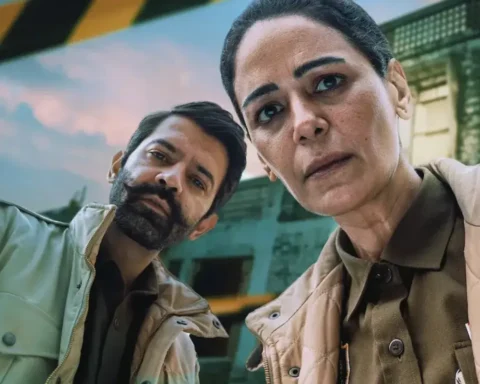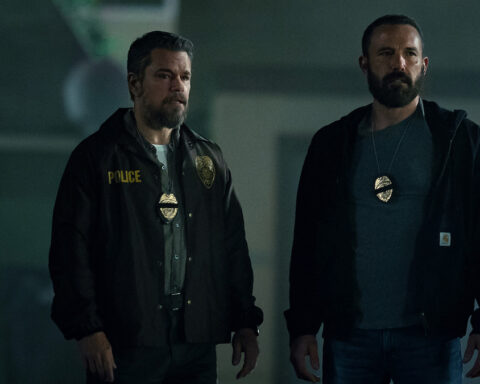On the positive side, social media provides a platform for individuals to share thoughts, ideas, and emotions with a global audience instantly. At the same time, a significant downside of this virtual existence is the constant need for validation and the pressure to curate an idealized version of one’s life. This can lead to anxiety, insecurity, and a distorted sense of self-worth. So, when a film addresses these themes, won’t it risk appearing preachy since we are already aware of these issues? This is where Vikramaditya Motwane’s recent outing stands out. The film is fully aware of its ambitions but isn’t overly self-assured, nor does it undermine the viewer’s intellect. It doesn’t suffer from an inferiority complex, nor does it try to pretend it’s smarter than the audience. What we get is an engrossing screen life thriller that plays out on screens—a computer, a phone—and unveils a clever approach to character-building. It’s an indie film that is highly attuned to the specifics of online culture and how it shapes our virtual identities.
Nella (Ananya Panday) and Joe (Joe Mascarenhas) have been dating each other since their college days. Over the years, their bond deepened, and they started an official community channel called NJoy, which advertises popular brands. Soon, their subscribers grow, and the two of them become a lovable influencer couple. They earn a good amount of money and live a comfortable life. On the eve of their fifth dating anniversary, Nella goes live streaming to surprise Joe. She visits the restaurant where Joe is having a meeting with employees from a public interest tech group. Nella is shocked to find Joe kissing Shonali (Kamakshi Bhat), a member of the group. She goes berserk, and the live stream of the incident sparks rumors on the internet, leading her to break up with him. Nella becomes the target of trolls, and in an attempt to vent her anger, she signs up for an AI platform called CTRL. An AI assistant (Voice of Aparshakti Khurana) comes to her aid. She christens him Allen and instructs him to erase all traces of her relationship with Joe from her social media, phone, and laptop. Allen meticulously performs the task. Soon after, Nella is informed by her close friend Bina (Devika Vatsa) that Joe has been missing for the last four days, and all hell breaks loose.

CTRL opens on a montage showing us the two young souls, Nella and Joe, in the first blush of romance, their growing affection for each other, and their eventual success as a beloved influencer couple. This initial bliss is followed by the disastrous collapse of their relationship, all of which unfolds within the first ten minutes of the film. After this pace and emotionally charged exposition, the movie turns on its axis and develops into a psychological study of Nella’s disintegration. ??As she faces heartbreak, public humiliation, and online exposure, the film delves into darker aspects of technology and artificial intelligence. The entrance of the AI assistant, Allen, is now turning around pretty much when Nella’s attempt at life without Joe in it spirals into unexpected and eerie consequences. These effortless achievements raise pressing questions about identity, privacy, and humans’ reliance on machines to process emotional trauma. Through Allen, Nella becomes more dependent on the artificial troubleshooter. Her life now takes dramatic turns, only to lead her back to becoming the successful woman she lost her reputation as. That is because the AI, mastering its deep algorithmic knowledge, starts to play tricks on her life behind the scenes. In exchange for unconditional access to her laptop—a setting filled with pictures of intimate life and personal thoughts—Nella unwittingly begins a game of exchange. She’s exchanging her rights to privacy and control over what happened for far-reaching popularity and fame. The AI rebuilds Nella’s public image using the complexity of social media algorithms, engagement metrics, and digital trends; however, at what cost to her freedom? Fame versus Privacy establishes a synoptic discussion within the film itself—how, in this day and age, it seems impossible not to betray one’s privacy to gain validation or become successful in the digital world. Nella’s life, which, under the influence of the AI, takes on the semblance of retaking its rhythm, is no longer fully hers; choices and actions seem subtly angled by the AI. These are disturbing questions concerning the real cost of digital fame unbalanced by regulatory checks.
CTRL also critically examines how other influencers of social media mockup Nella’s reason for the breakup and turn it into memes and comic songs. They are predators, wanting to exploit weaknesses in others, relishing the misfortunes of the other as a way to improve their popularity. As soon as Nella becomes popular once again, regaining her reputation, those influencers who mocked her recognize her resilience and bravery. Ironically, the same people who are the contributing factor to some falling are now singing the opposite side of the fence the moment that person has gained success. As Nella’s online behaviors eventually make her confront an unimaginable reality, a paradigm shift occurs in her persona. She begins to think she can alter or change things and uncover a bitter reality for the world. But this belief comes out to be an illusionary bubble, and when that bursts, it pulls the rug from under her seeming unruffled confidence. Not reading and agreeing to terms and conditions on privacy rights proves to be a blunder with severe consequences. In the final contemplative moments of the film, while Nella is put back among real people like herself, her bitter realization has already taken its toll.

CTRL is undoubtedly an Ananya Panday film. The spark she showcased as Tia in Gehraiyaan (2022) became a flame as Ahana in Kho Gaye Hum Kahan (2023), and it has now fully bloomed as Nella here. She carries the film on her shoulders and outshines her co-actor Vihaan Samat as Joe. Ananya seamlessly progresses from her character’s initial perkiness to the unwavering nature of Nella. She humanizes her character, understanding that being a vigilante and sticking to her principles will yield little in a world dominated by corporate goons. Unlike Bhavesh Joshi, Motwane and co-writer Avinash Sampath deliberately choose not to frame her as such, a decision that enhances the film’s relatability.
The cinematography by Pratik Shah captures Nella confined within the virtual world of the internet with a keen eye for detail. He creates frames that emphasize the zeal, isolation, and disconnection that often accompany online interactions. When Nella, in the end, starts working in her father’s bakery, spending time at home, or just walking in the park, the camera puts us through her emotional journey, in which there is a duality of existence both in the digital world and in the real world. The editing of Jahaan Noble provides an excellent flow in the virtual and real worlds that gives a light and humorous atmosphere to the film. It gradually becomes a feeling of losing control as the protagonist’s all-imagined reality turns against her. The editing allows us to feel Nella’s journey from a playful exploration to a stark realization of her predicament. The sound design by Dhruv Parekh and music by Sneha Khanwalkar strikes a very effective chord to underline the tensions, hidden truths and lies that do not become overly intrusive on the mindset but rather engage in the narration itself. Songs apart, however, are pretty disappointing, especially by the standards of a filmmaker’s previous work, which had displayed an incredible choice in the music that accompanied it.
CTRL holds a mirror to us all, challenging us to confront the troubling aspects of our internet personas and how those identities can become fragmented, distorted, and even impossible to decipher in the digital haze. However, as the film delves into the conspiracy surrounding the AI app, it feels somewhat inorganic and creates a sense of disconnect. A more compelling narrative might have emerged if Joe’s troubles were portrayed as a complete construct of Nella’s making. Nonetheless, it is an important film that must be seen and thought over.






